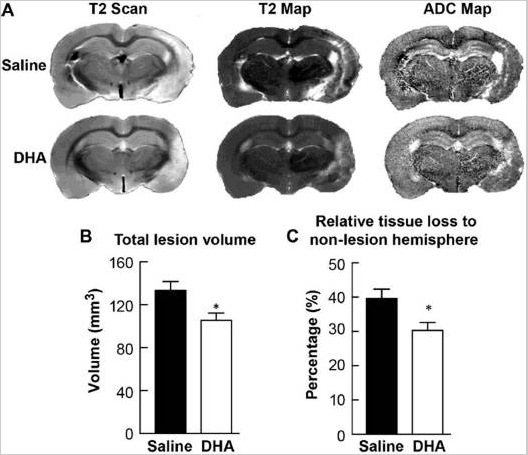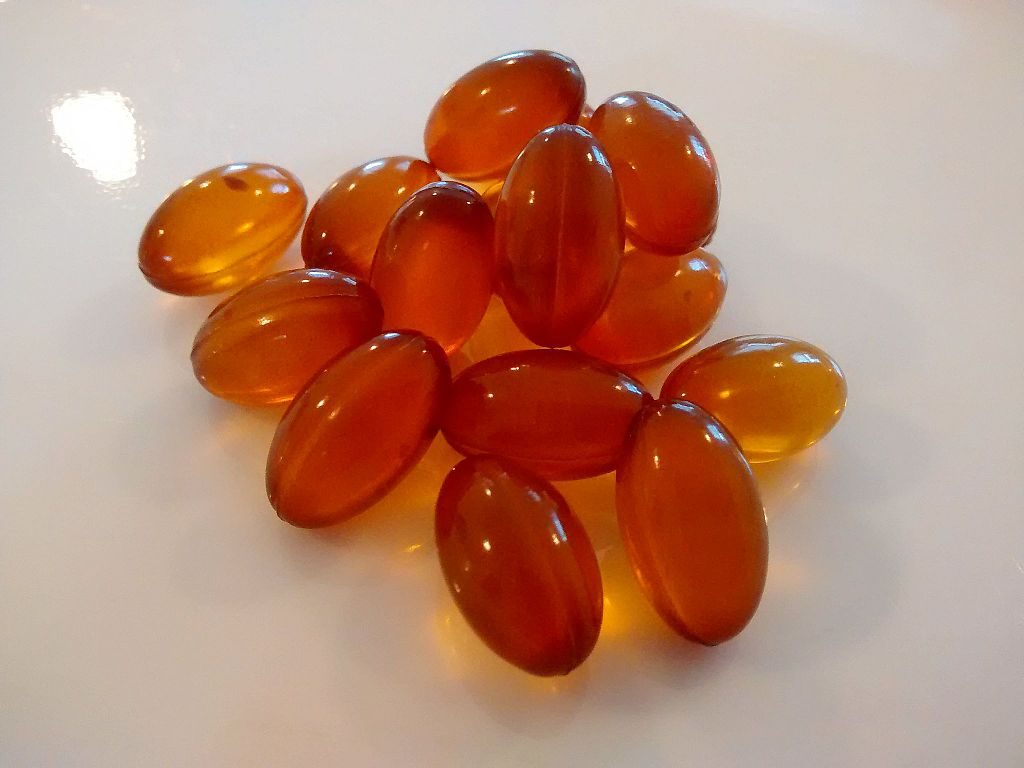Despite conflicting research, DHA is widely used to buttress cognitive development and prevent cognitive impairment.

DHA is an omega 3 fatty acid believed to offer a wide variety of health benefits. Similar to other nootropics, it seems particularly capable of promoting brain health through:
- Neuroprotection. The antioxidant and anti-inflammatory activities of DHA as well as its ability to combat brain plaques may collectively empower it to protect neurons from injury and deterioration.
Overview
Docosahexaenoic acid (DHA), similar to eicosapentaenoic acid (EPA), is an omega-3 fatty acid that serves as one of the main structural components of the human brain, skin, and retina. It is most widely recognized as an algae and phytoplankton by-product that is accordingly present in fish oil, but it can also be obtained from breast milk.
The essential nature of the omega 3 fatty acids in the brain and body have stirred interest in their use in health and medicine. Along with EPA, DHA is regularly used to help manage numerous conditions, including heart disease, asthma, hay fever, lung disease, lupus, headaches, dermatitis, and arthritis, to name a few.
DHA has been identified as a particularly critical compound for the mental development of infants, which has led to belief in its potential to impart nootropic effects. Its effectiveness as a nootropic for adult mood and cognition is being hotly investigated.

How DHA Might Help the Brain
Structural development
DHA is a fundamental component of normal neural function, and is believed to play a vital part in neuronal membranes.1 Moreover, supplementation with DHA has been shown to contribute to the structural development and growth of brain tissue through an unclear mechanism.2 3
Attenuate amyloid beta secretion
The formation of toxic amyloid beta (A-β) plaques in the brain is a well-documented cause of memory loss and other cognitive deficits. DHA has been shown to significantly reduce the presence of beta amyloid plaques by:
- Increasing the presence of a sorting protein known as LR11.4
- Stimulating the synthesis of a protein, NPD1, that promotes brain cell survival and suppresses the toxicity of amyloid beta plaques.5
Antioxidation
DHA has been shown to confer neuroprotection in numerous instances, in no small part due to its ability to increase antioxidant capacity.6 7 An increased presence of DHA in the brain was found to significantly reduce memory errors by suppressing compounds causing oxidative stress, specifically lipid peroxide and reactive oxygen species.8

DHA Nootropic Benefits & Uses
DHA is most commonly supplied to infants in the first 4 – 6 months of life in order to improve their mental development. Inadequate amounts of DHA in fetuses and infants has been shown to consequence in behavioral, functional, and neurological disorders.9
Low DHA levels have further been associated with cognitive deficits, which is why it is used to prevent disorders of the mind in people with insubstantial DHA, despite lacking consistent clinical backing.10 It has specifically been used to help manage such health conditions as:11
- Attention deficit/hyperactivity disorder (AD/HD). DHA may help children with ADHD be less aggressive, although it does not seem to improve ADHD symptoms per se.
- Depression. DHA may mildly improve mood as well as reduce aggressive behavior.
- Alzheimer’s. The neuroprotective effects of DHA may attenuate memory loss and improve memory-related learning.12 13
- Dyslexia. DHA may improve various aspects of dyslexia.14

Research
Animal Research
Animal research indicates that DHA may:
- Improve memory-related learning in rats17 18
- Improve spatial cognition and focus in rats19
- Prevent learning deficiencies by increasing antioxidant defense in rats20
- Ameliorate spatial cognitive deficits in rats21
- Increase neuroprotection in aged rats affected by low blood supply to the brain22
Human Research
Clinical studies have presented conflicting findings concerning the impact of DHA on cognitive function. Its impact on mood and cognition seems to be mild, at best.
DHA (2 g) may slightly improve depression
In this randomized, placebo-controlled investigation, 36 patients with depression were given either a placebo or 2 g of DHA daily for 6 weeks. A slight improvement in ratings of depression (27.8%) compared to the placebo (23.5%) were reported, though the change was not statistically significant.
- The researchers concluded that “this trial failed to show a significant effect of DHA monotherapy in subjects with major depression.”23
DHA (1 g) may help reduce mild depression, but not as much as EPA
In this randomized, double-blind, placebo-controlled investigation, 81 patients with mild to moderate depression were given either a placebo, 1 g of EPA, or 1 g of DHA daily for 12 weeks. The DHA group showed slight improvements in depression compared to the placebo, but only the EPA group demonstrated significant improvements.
- The researchers concluded that “these data suggest greater efficacy of EPA compared to DHA or placebo as an adjunctive treatment in mild-to-moderate depression.”24
DHA (1 g) might not improve depression more than placebo
In this randomized, placebo-controlled, double-blind investigation, 196 adults with depression were given either a placebo, 1 g of EPA, or 1 g of DHA every day for 8 weeks. All 3 groups experienced significant improvement in depression, with no significant differences among them.
- The researchers concluded that “neither EPA-enriched nor DHA-enriched n-3 was superior to placebo for the treatment of MDD.”25
DHA (~0.51 g) might not improve symptoms related to AD/HD
In this placebo-controlled, double-blind investigation, 40 children with attention-deficit/hyperactivity disorder (AD/HD) were given either a placebo or fish oil rich foods containing 3.6 g of DHA per week (or ~0.51 g per day) for 2 months. No significant differences between the groups were found, except for slight improvements in short-term memory and continuous performance in the placebo compared to DHA.
- The researchers concluded that “DHA supplementation did not improve AD/HD-related symptoms.”26
DHA (345 mg) might not improve subjective or objective symptoms of AD/HD
In this randomized, placebo-controlled, double-blind investigation, 60 children with AD/HD were given either a placebo or 345 mg of DHA every day for 4 months. No statistically important improvements in subjective (child behavior) or objective (attention, clarity, memory) AD/HD symptoms were found.
- The researchers concluded that “4-month period of DHA supplementation (345 mg/d) does not decrease symptoms of ADHD.”27
DHA (900 mg) may improve learning and episodic memory functions
In this randomized, double-blind, placebo-controlled investigation, 485 elderly adults were given either a placebo or 900 mg of algal DHA for 6 months. The DHA group presented significantly fewer learning errors and positive effects on verbal recognition memory compared to the placebo group.
- The researchers concluded that “data reveal a potentially beneficial role for DHA in preventing or ameliorating cognitive decline and cardiovascular disease in the aged.”28
DHA (900 mg) may reduce learning errors and improve memory
In this randomized, double-blind, placebo-controlled investigation, 485 adults over the age of 55 years were given either a placebo or 900 mg of DHA for 24 weeks. DHA supplementation resulted in significantly fewer learning errors and improve verbal recognition memory, but not working memory or executive functions of the mind compared to the placebo. DHA presented no serious adverse side effects.
- The researchers concluded that “DHA improved learning and memory function in ARCD and is a beneficial supplement that supports cognitive health with aging.”29
Nootropic Dosage
- Successful clinical research studies have used from 345 mg – 2 g of DHA per day.
- Typical supplements range from 250 – 500 mg of pure DHA per day.
Available Forms
- Capsules, tablets, or softgels
- DHA supplements can be from a marine (fish oil), plant, or algal source
Supplements in Review Says
- DHA 72 – 312 mg as a nootropic.
DHA is essential for cognitive development and may offer additional nootropic benefits. DHA has demonstrated considerable potential in enhancing various facets of mood, memory, and cognitive function, but its application in clinical trials has thus far turned out conflictive outcomes.
Adequate DHA dosing depends on total omega-3 fatty acid consumption. Medical professionals generally recommend consuming no more than 1000 mg of omega 3 fatty acids (500 mg EPA + 500 mg DHA) per day. So, those who regularly consume fish and algae should take care not to use high doses of DHA. We suggest starting at a low dose of 72 – 312 mg.
Leave a Reply